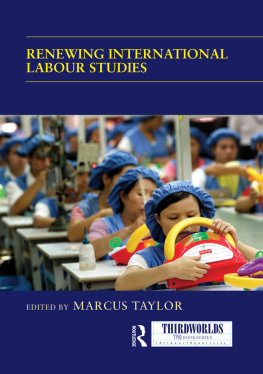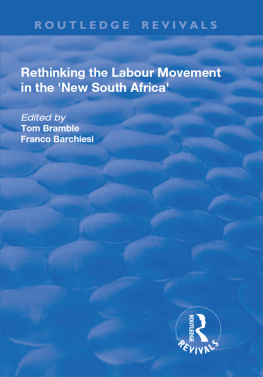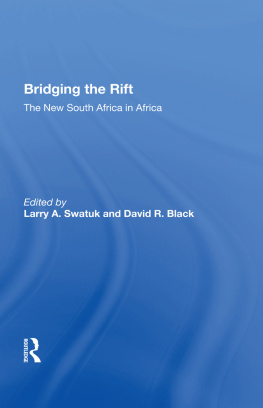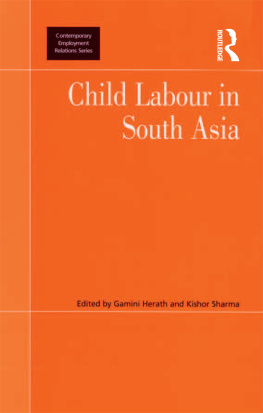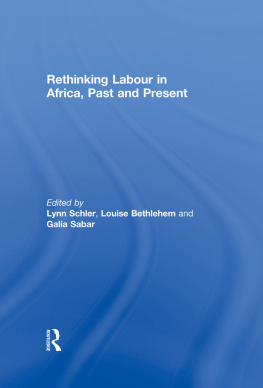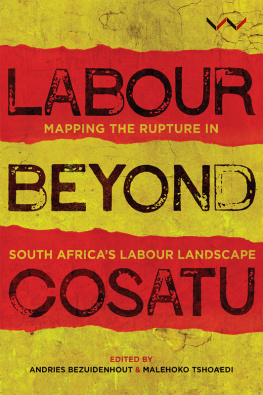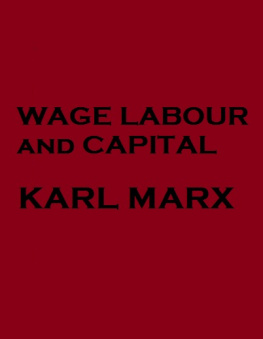Capital and labour in South
AfricaMonographs from the African Studies Centre, Leiden
Capital and labour in South
Africa
Class struggle in the 1970s
D. du Toit
First published in 1981 by
Kegan Paul International
This edition first published in 2010 by
Routledge
2 Park Square, Milton Park, Abingdon, Oxon, 0X14 4RN
Simultaneously published in the USA and Canada
by Routledge
270 Madison Avenue, New York, NY 10016
Routledge is an imprint of the Taylor & Francis Group, an informa business
African Studies Centre, Leiden 1981
Transferred to Digital Printing 2010
All rights reserved. No part of this book may be reprinted or reproduced or utilised in any form or by any electronic, mechanical, or other means, now known or hereafter invented, including photocopying and recording, or in any information storage or retrieval system, without permission in writing from the publishers.
British Library Cataloguing in Publication Data
A catalogue record for this book is available from the British Library
ISBN 10: 0-7103-0001-8 (hbk)
ISBN 13: 978-0-7103-0001-0 (hbk)
Publisher's Note
The publisher has gone to great lengths to ensure the quality of this reprint but points out that some imperfections in the original copies may be apparent. The publisher has made every effort to contact original copyright holders and would welcome correspondence from those they have been unable to trace.
Contents
Tables
The decline in foreign investment 19757 (Rm.)
Real wages of African miners 190569
Prosecutions and removals in terms of the pass laws 196970
Distribution of the African population, 1970
Membership of registered trade unions as at 31 December 1971
Strikes by African workers, 196872
Statistics of the Durban strikes, 1973
The inflationary process in South Africa, 196775
South African balance of payments, 19705 (Rm.)
Rates of profit in manufacturing industry, 196472 (Rm.)
Manufacturing profits and capital expenditure, 19705 (Rm.)
Employment in manufacturing industry, 19705
Consumer price index, 196975
Average weekly wage for African workers: all industries (19712) (R)
Poverty datum line, March-April 1973
Average annual earnings of African industrial workers, 19705
African unemployment (estimated), 19706
Strikes by African workers, 19735
Africans registered at local and district labour bureaux, 19725
Pass law prosecutions, 19725
Africans arrested and referred to aid centres, 19725
Prohibitions of published material, 19735
Convictions in terms of security laws, 19735
Participation in CRC elections, 1969 and 1975
Introduction
This study was begun in Cape Town in 1974 and published as a legal thesis (somewhat lengthier than the present edition) at the University of Leiden, the Netherlands, in 1979.
The limitations of this work should be noted at the outset. It does not pretend to provide a definitive, all-round analysis of social relations in South Africa. Its chief aim is to examine the class nature of the social struggle in South Africa and, in particular, to illustrate the nature that this struggle has taken on in practice.
As such, it concentrates on certain aspects of this vast and complex subject that were pushed to the fore in practice and appeared to be most in need of discussion and clarification. Other questions, including some of great importance, are treated in less detail. The position of South Africa within the world capitalist system, for instance, and the implications of the South African revolution for Southern Africa as a whole, are dealt with only briefly. Yet these two questions, above all, are fundamental to any understanding of South African society. For this reason the passages concerned (pp. 89, 234, 2479, etc.) deserve to be given all the more attention.
The main focus of the book is the concrete unfolding of the class struggle in South Africa in the course of the 1970s. It was written in the course of a period of momentous social change in Southern Africa and on a world scale. Different chapters reflect different stages in a rapidly developing situation. The historical chapters in particular were written at a time when much of the analysis of South Africa that has been stimulated by the events of recent years had not yet appeared in print, in the light of which a clearer, more incisive treatment would have been possible. Nevertheless, to preserve the completeness of the work as a whole, these chapters could not be omitted.
Inevitably, in a number of respects, this account has already been overtaken by events. Nevertheless its main conclusions especially in regard to the class foundations of racial conflict in South Africa, and the crucial but contradictory role of the traditional black nationalist leadership within the movement of the working class have been abundantly confirmed. The struggles of the workers and the youth have risen to new heights; the strike movement of 197980 has surpassed even the struggles of 1973. Conversely, the crisis of the Botha government has become even more acute than that of its predecessor. On the one hand it is driven by irrestistible mass pressure to change its methods of rule; on the other hand it is threatened with destruction by those same forces if it should yield one centimetre or lose its basis of white support. Confusion and division are rife within its ranks and in those of the capitalist class as a whole, which remains completely unable to meet the demands of the black masses. In this situation the question stands forth more sharply than ever before: what must take the place of the white capitalist regime when it crumbles, as sooner or later it must? What alternatives are at hand?
Here, too, events have confirmed that the strongest potential forces among the oppressed population remain the traditional mass organisations, in particular the African National Congress. This has remained so despite their continued lack of involvement in the struggles erupting on the ground. At the same time it is clear that the contradictions within the ANC and the South African Congress of Trade Unions in essence, the conflict between middle-class leaders in exile (supported by the SA Communist Party) and the pressures of the proletarian masses at home -have by no means been resolved. On the contrary, over the recent period they have crystallised into a struggle for or against Marxism, for or against the task of organising the working-class following of the ANC on the basis of its own revolutionary programme that must become the programme of the movement as a whole.
Everything indicates that this struggle will be resolved only in practice, in the approaching situation where the SA state will no longer be able to prevent the presently illegal organisations, and tendencies within organisations, from competing openly for mass support. Under these conditions the alternatives to the existing regime will at last present themselves concretely to the black working-class population, and indeed to workers of all races on the one hand, the utopian programme of national democracy within the framework of capitalism, on the other hand the fight for the simultaneous abolition of national oppression and capitalist exploitation.




